外研版必修5 Module 1 British and American English Vocabulary and Listening, Everyday English课件(47张ppt)
文档属性
| 名称 | 外研版必修5 Module 1 British and American English Vocabulary and Listening, Everyday English课件(47张ppt) |
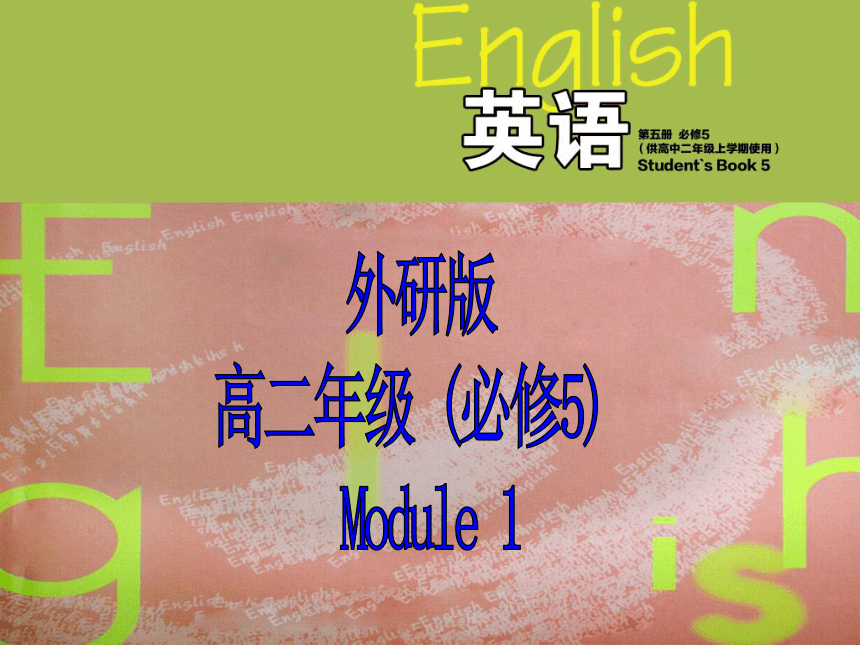
|
|
| 格式 | zip | ||
| 文件大小 | 2.2MB | ||
| 资源类型 | 教案 | ||
| 版本资源 | 外研版 | ||
| 科目 | 英语 | ||
| 更新时间 | 2022-02-11 20:38:53 | ||
图片预览

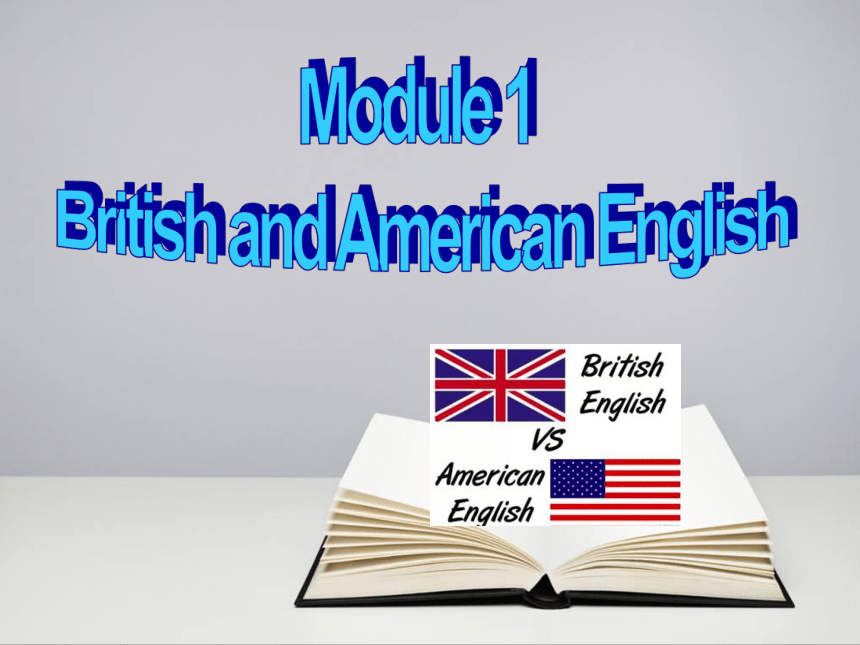

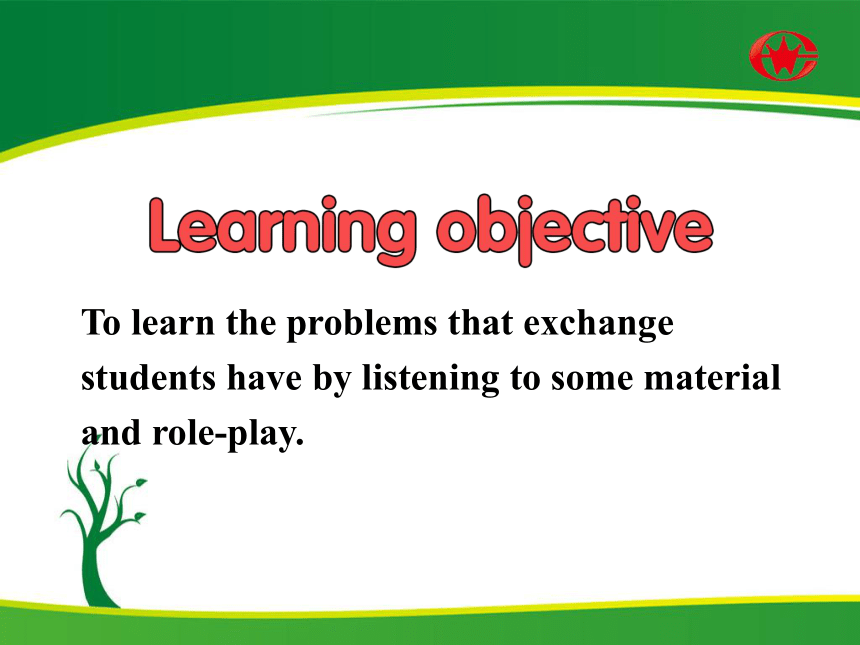
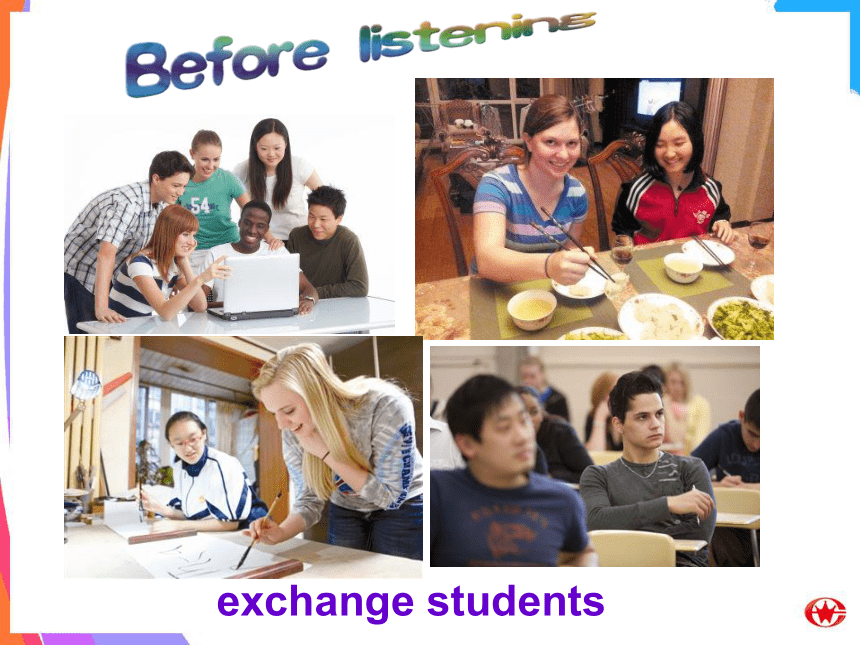
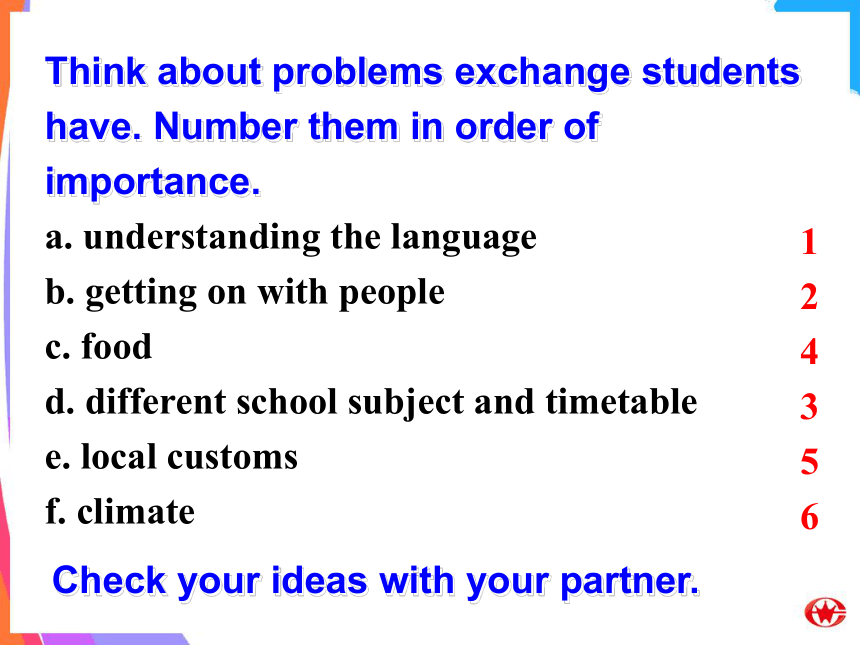
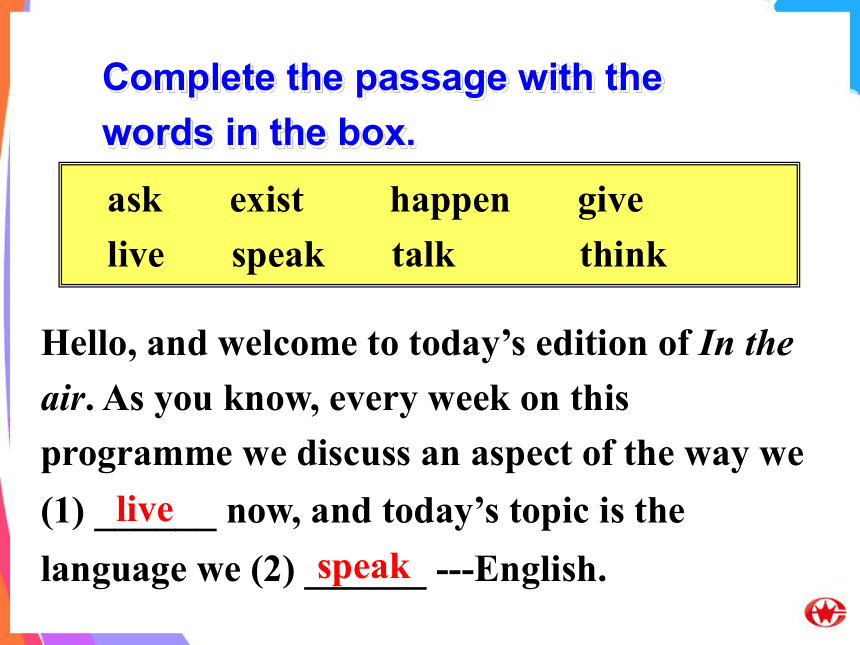
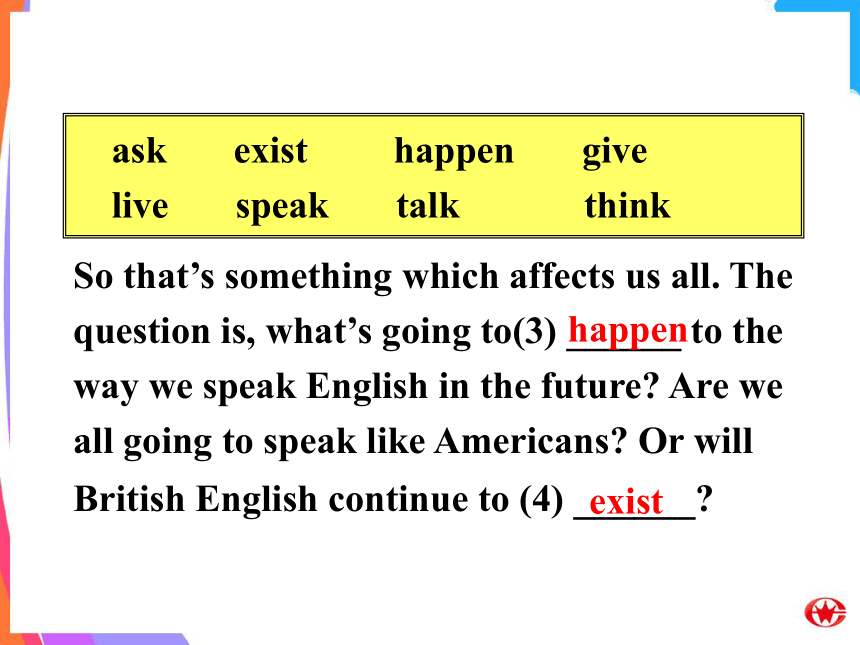
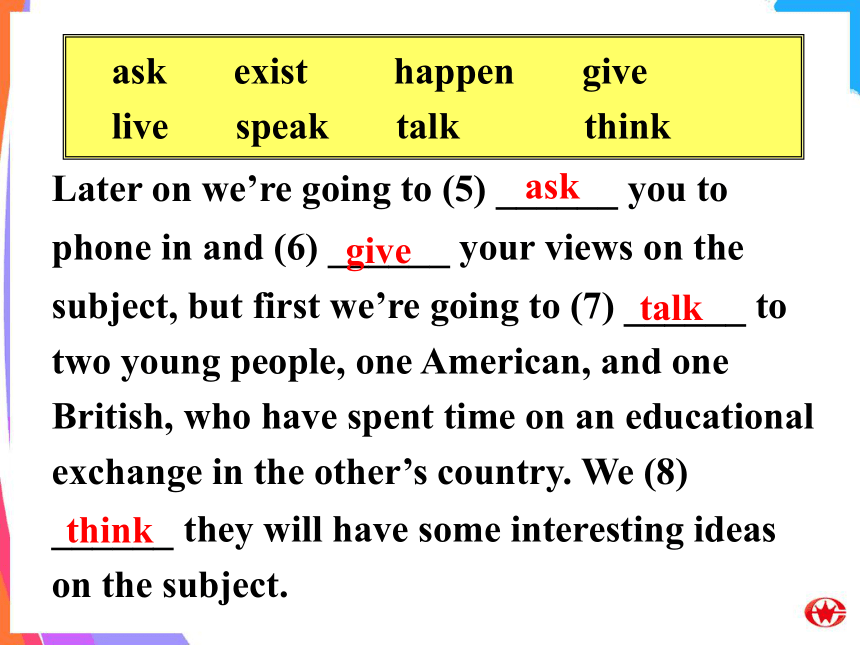
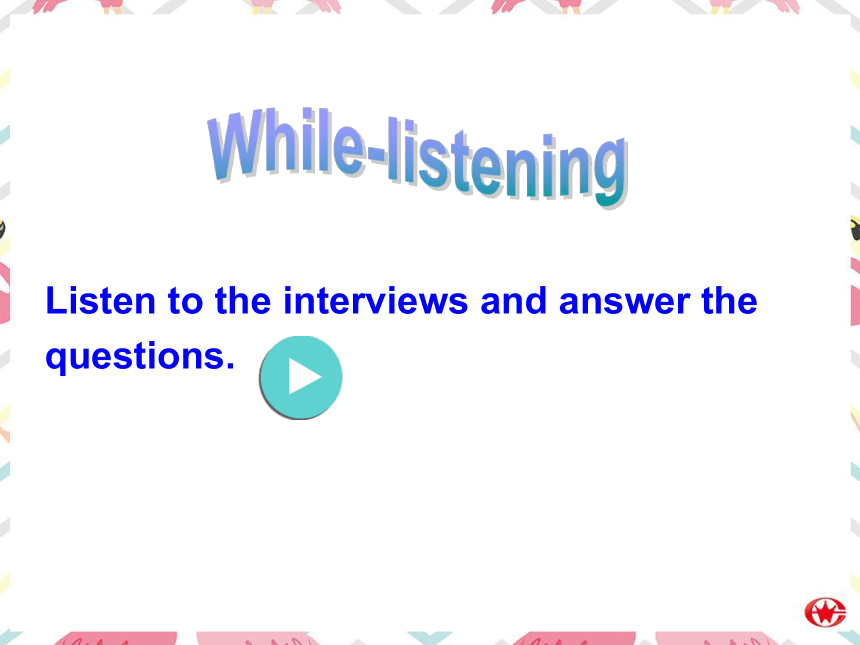
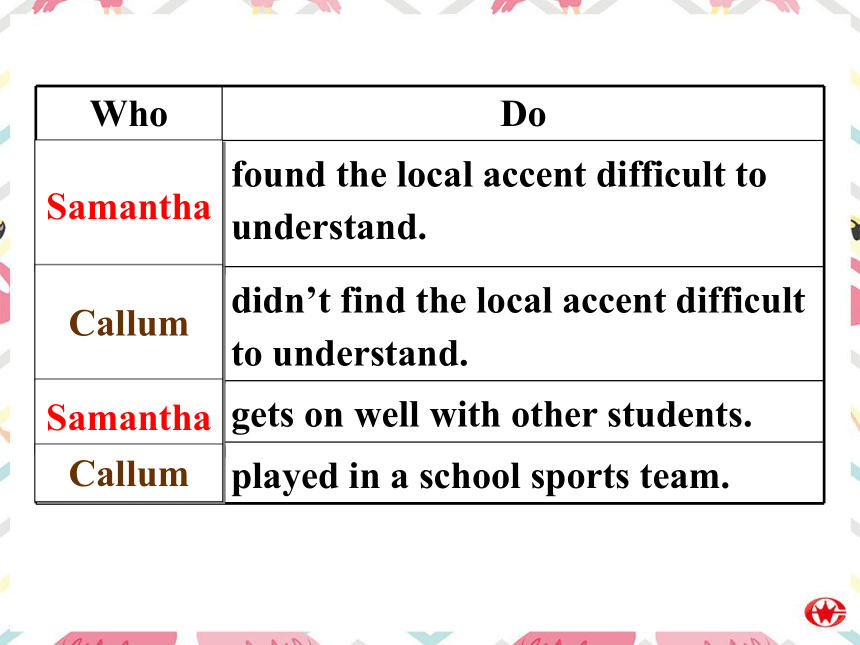
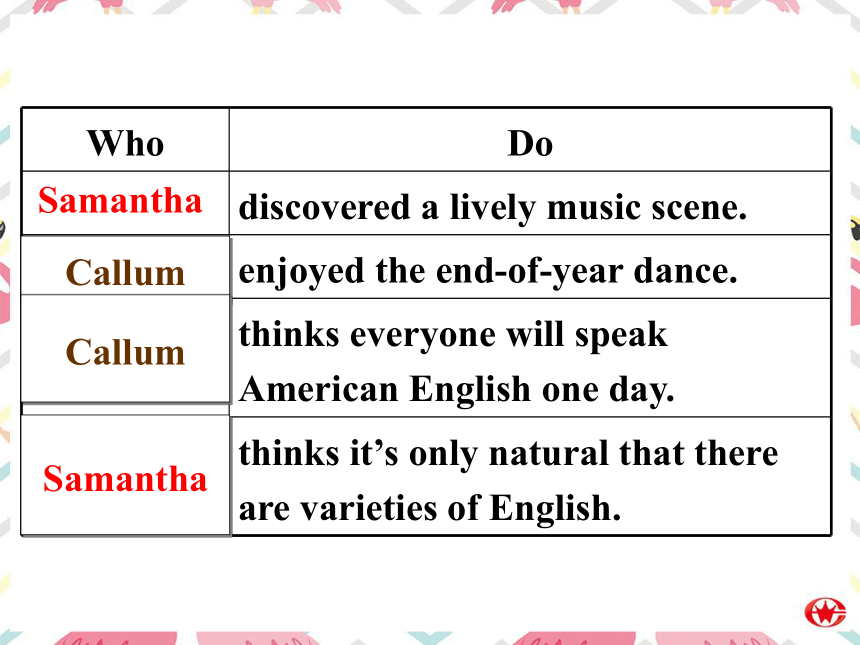
文档简介
(共47张PPT)
To learn the problems that exchange students have by listening to some material and role-play.
exchange students
Think about problems exchange students have. Number them in order of importance.
1
2
4
3
5
6
a. understanding the language
b. getting on with people
c. food
d. different school subject and timetable
e. local customs
f. climate
Check your ideas with your partner.
Complete the passage with the words in the box.
Hello, and welcome to today’s edition of In the air. As you know, every week on this programme we discuss an aspect of the way we (1) ______ now, and today’s topic is the language we (2) ______ ---English.
ask exist happen give
live speak talk think
live
speak
So that’s something which affects us all. The question is, what’s going to(3) ______ to the way we speak English in the future Are we all going to speak like Americans Or will British English continue to (4) ______
happen
exist
ask exist happen give
live speak talk think
Later on we’re going to (5) ______ you to phone in and (6) ______ your views on the subject, but first we’re going to (7) ______ to two young people, one American, and one British, who have spent time on an educational exchange in the other’s country. We (8) ______ they will have some interesting ideas on the subject.
ask
give
talk
think
ask exist happen give
live speak talk think
Listen to the interviews and answer the questions.
Who Do
found the local accent difficult to understand.
didn’t find the local accent difficult to understand.
gets on well with other students.
played in a school sports team.
Samantha
Callum
Samantha
Callum
Who Do
discovered a lively music scene.
enjoyed the end-of-year dance.
thinks everyone will speak American English one day.
thinks it’s only natural that there are varieties of English.
Callum
Callum
Samantha
Samantha
Listen to the first part of the passage and
complete the passage.
Hello, and welcome to today’s edition of In the air. As you know, every week on this programme we discuss an aspect of the way we 1________now, and today’s topic is the language we 2________—English. So that’s something which affects us all. The question is, what’s going to 3________to the way we speak English in the future
live
speak
happen
Are we all going to speak like Americans Or will British English continue to 4 ________ Later on we’re going to 5 ________ you to phone in and 6 ________ your views on the subject, but first we’re going to 7 ________ to two young people, one American, and one British, who have spent time on an educational exchange in the other’s country. We 8 ________ they will have some interesting ideas on the subject.
exist
ask
give
talk
think
INT: I’d like to speak to our American guest first.
Hi, Samantha, welcome to the _________,
and welcome to England!
SAM: Thanks!
INT: _________ are you from
SAM: I’m from Albany, in New York State.
INT: _________ did you arrive in the UK
SAM: Two months ago, in September, at the
_________ of the school term.
show
beginning
Where
When
Listen to Part 2&3 and fill in the blanks.
INT: How did you get to hear about the
exchange
SAM: I saw an _____________ in my school
magazine _________ in the States.
INT: Where are you _________ school now
SAM: In Leeds, in Yorkshire.
INT: And how are you _________ _________
SAM: I’m getting on just fine, now that I
understand the local _________.
INT: So, it was difficult at first
advertisement
back
attending
getting on
accent
SAM: Yes, because I didn’t _________ what
people were saying for _________
_________ _________ days. I think that
was the biggest problem I had when I
_________.
INT: But then you _______ _______ _______ it
SAM: Yes - and now it seems quite _________.
In fact, in some ways the accent here, in
the north of England, _________ me of
American English.
get
a
arrived
got used to
normal
reminds
couple of
INT: How do you mean
SAM: Well, like they say bath _______ _______
bath, or Do you want to dance instead of
dance, like they do in other parts of
Britain.
INT: What’s been the most _________ thing
about the exchange _________ _________
SAM: _________ the people, especially the
other students in my class. They’re
really friendly.
instead of
positive
so far
Definitely
INT: Is there _________ _________ you like
about living in Britain
SAM: Lots of things, like the music scene in
Leeds, _________ _________. I like Leeds
because there’s more going on here than
back home in the States. The school has a
_________ music laboratory, which is
really interesting.
anything else
creative
for instance
INT: I’ve got a question to ask you, Samantha,
about the _________ of English. Do you
think in the future everyone will speak
American English
SAM: No, why should they Since English is
spoken all over the world, I guess it’s
only _________ that there are lots of
_________.
INT: So do you think you’ll go home _________
with a north of England accent
SAM: Oh no, I didn’t mean that!
future
natural
varieties
speaking
INT: Well now I’d like to _________ _________
our other guest, another exchange student,
that’s ________________ Callum
Nightingale. Callum, you recently returned
from the US. How long were you there
CAL: Ten months _________.
INT: And where were you
CAL: I was in a _________ agricultural region,
in a _________ small town in Mississippi.
turn to
altogether
fertile
fairly
eighteen-year-old
INT: That’s quite a long way _________, isn’t it
CAL: Yes, it is.
INT: What was the most difficult problem you
had
CAL: I _________ it was the _________; it was
hot and humid for a lot of the time.
INT: How did you _______ ________ ________
American English
CAL: Well, I didn’t really have any problems
with the accent. It was easy to understand,
they speak _________ _______.
south
reckon
climate
get on with
rather slowly
INT: But did they understand you
CAL: That’s a good _________. I think they
did. As I was the only British person in
the school they _________ _________
_________ of me. The girls all said my
accent was _________.
INT: What was the best moment of your stay
CAL: I think it was the _________, that’s the
school dance at the end of the year.
point
made a
cute
prom
fuss
INT: I want to ask you a couple of questions
about American English. Did you find that a
lot of words are _________
CAL: Yes, especially _________ _________ - they
have grades, we have years, then the names
of subjects are _________ _________
different, like “civics”, which basically
means _________ and ___________. And
some sports are different - football means
American football, not _________ - I
actually played in the soccer team.
a bit
law
government
soccer
different
at school
Then the American word for maths is _________, without the “s” - that seems like a very small detail. But the first time I heard it, it sounded _________ ... but you get used to it. When I came home my mum said I had _________ _________ an American accent, but it’s _________ _________ now I think.
INT: Callum, do you think that in the future
everybody will speak an American
_________ of English
math
strange
picked up
worn off
variety
CAL: Maybe yes. I think the British will
speak American English because they
_________ it every day now, on
_________, in _________ and so on.
INT: And are you _________ about that
CAL: I don’t know. I _________ I don’t
mind, really. Everything changes
_________ _________ _________.
hear
happy
suppose
sooner or later
TV
films
Listen again and answer the questions.
Which part of the country is Samantha staying in
The north of England (Leeds in Yorkshire).
2. How long did it take her to understand what people were saying
Two months.
3. What did she notice about the pronunciation of words like dance and bath
They’re the same as in American English.
4. What is the last question the interviewer asked Samantha
Do you think you’ll go home speaking with a north of England accent
5. How long did Callum spend in the US
Ten months.
6. What didn’t he like about the place he stayed in
The climate (hot and humid).
7. What did he say about the way people spoke
It was easy to understand; they spoke rather
slowly.
8. What did girls like about Callum
His English accent (it was cute).
Complete the sentences with the correct phrases.
1. How are you getting on is a question about ___. A. Samantha’s health B. what Samantha is doing
2. I didn’t get what people were saying means ____. A. I didn’t understand it B. I didn’t like it
3. When Samantha got used to the accent she ____. A. began to understand it B. used it when she spoke English
4. So far means _____.
A. for a long time B. until now
5. That’s a good point means ____.
A. what you say is interesting
B. I agree with you
6. The girls in Callum’s school made a fuss of him by __. A. laughing at him B. showing a lot of interest in him
7. A cute accent is ____.
A. horrible B. attractive
8. A couple of means ____. A. two B. two or three
9. If Callum picked up the local accent he ____. A. started to use it B. wasn’t able to use it
10. If Callum’s American accent has worn off, it has ___.
A. disappeared B. become very noticeable
1. That’s a good point…那是好的一点……
point 1) 要点; 中心思想
e.g. He missed the whole point of my
speech. (翻译)
他没弄明白我整个演说的要点。
2) 意义;目的;用途un. (+in/of)
e.g. There is no point in complaining.
抱怨没有任何意义。
【语境应用】完成句子。
1) 这个女孩正指着博物馆里的某个东西。
The little girl is ________________
something in the museum.
2) 我希望他快点说正题。
I wish he would get to the ________.
pointing to / at
point
2. If Callum picked up the local accent…
如果凯勒姆学会当地口音……
pick up 意为:①取回,收集;②拿起,捡起,举起;③让人乘车,搭载;④(偶然)得到,学会;⑤增加(速度),加速。
e.g. We can pick up the tickets an hour before
the play begins.
He picked up the phone and dialed the
number.
The bus picks up passengers outside the
airport.
Nicole soon picked up French when she
went to live in France.
The train began to pick up speed.
【语境应用】写出下面各句中pick up的中文释义。
1) She picked up the book and gave it to
him. _____________________
2) I’ll pick you up at the station at five this
afternoon. _____________________
3) He picked up some computer knowledge just
by playing computer games.
_____________________
捡起来
接(某人)
非正规地)学会,学到
3. If Callum’s American accent has worn off,…
如果卡勒姆的美国口音消失了,……
wear off 慢慢消失
e.g. The pain in his back is wearing off.
(翻译)
他背部的疼痛正在慢慢消失。
【拓展】
wear out 使疲惫不堪
e.g. He was worn out by the hard work.
(翻译)
繁重的工作使他疲惫不堪。
常见的含off的短语有:
go off意为:①离开(尤指去做某事);②开火,爆炸;③(警报器等)突然发出巨响;④(电灯)熄灭。
put off意为“推迟,延迟”。
pay off意为:①付清,偿清;②得到好结果,取得成功。
set off意为:①出发,动身;②使(炸弹等)爆炸;③使(警报)响起。
see off意为:①为……送行,送别;②赶走,驱逐(某人);③(在游戏、战斗等活动中)打败,击败。
【语境应用】用含off的短语的正确形式填空。
1) I saw Amy ________ angrily without telling
us.
2) Never ________ till tomorrow what may be
done today.
3) The home team ________ the challengers by
68 points to 47.
4) Having said good-bye to their friends, they
________ for home.
go off
put off
saw off
set off
5) All her hard work ________ in the end,
and she finally passed the exam.
6) Wives used to ________ their husbands
________ to work at the front door, but
this is no longer common.
paid off
see
off
Do exercises 9-12 on page 69, 70.
To learn the problems that exchange students have by listening to some material and role-play.
exchange students
Think about problems exchange students have. Number them in order of importance.
1
2
4
3
5
6
a. understanding the language
b. getting on with people
c. food
d. different school subject and timetable
e. local customs
f. climate
Check your ideas with your partner.
Complete the passage with the words in the box.
Hello, and welcome to today’s edition of In the air. As you know, every week on this programme we discuss an aspect of the way we (1) ______ now, and today’s topic is the language we (2) ______ ---English.
ask exist happen give
live speak talk think
live
speak
So that’s something which affects us all. The question is, what’s going to(3) ______ to the way we speak English in the future Are we all going to speak like Americans Or will British English continue to (4) ______
happen
exist
ask exist happen give
live speak talk think
Later on we’re going to (5) ______ you to phone in and (6) ______ your views on the subject, but first we’re going to (7) ______ to two young people, one American, and one British, who have spent time on an educational exchange in the other’s country. We (8) ______ they will have some interesting ideas on the subject.
ask
give
talk
think
ask exist happen give
live speak talk think
Listen to the interviews and answer the questions.
Who Do
found the local accent difficult to understand.
didn’t find the local accent difficult to understand.
gets on well with other students.
played in a school sports team.
Samantha
Callum
Samantha
Callum
Who Do
discovered a lively music scene.
enjoyed the end-of-year dance.
thinks everyone will speak American English one day.
thinks it’s only natural that there are varieties of English.
Callum
Callum
Samantha
Samantha
Listen to the first part of the passage and
complete the passage.
Hello, and welcome to today’s edition of In the air. As you know, every week on this programme we discuss an aspect of the way we 1________now, and today’s topic is the language we 2________—English. So that’s something which affects us all. The question is, what’s going to 3________to the way we speak English in the future
live
speak
happen
Are we all going to speak like Americans Or will British English continue to 4 ________ Later on we’re going to 5 ________ you to phone in and 6 ________ your views on the subject, but first we’re going to 7 ________ to two young people, one American, and one British, who have spent time on an educational exchange in the other’s country. We 8 ________ they will have some interesting ideas on the subject.
exist
ask
give
talk
think
INT: I’d like to speak to our American guest first.
Hi, Samantha, welcome to the _________,
and welcome to England!
SAM: Thanks!
INT: _________ are you from
SAM: I’m from Albany, in New York State.
INT: _________ did you arrive in the UK
SAM: Two months ago, in September, at the
_________ of the school term.
show
beginning
Where
When
Listen to Part 2&3 and fill in the blanks.
INT: How did you get to hear about the
exchange
SAM: I saw an _____________ in my school
magazine _________ in the States.
INT: Where are you _________ school now
SAM: In Leeds, in Yorkshire.
INT: And how are you _________ _________
SAM: I’m getting on just fine, now that I
understand the local _________.
INT: So, it was difficult at first
advertisement
back
attending
getting on
accent
SAM: Yes, because I didn’t _________ what
people were saying for _________
_________ _________ days. I think that
was the biggest problem I had when I
_________.
INT: But then you _______ _______ _______ it
SAM: Yes - and now it seems quite _________.
In fact, in some ways the accent here, in
the north of England, _________ me of
American English.
get
a
arrived
got used to
normal
reminds
couple of
INT: How do you mean
SAM: Well, like they say bath _______ _______
bath, or Do you want to dance instead of
dance, like they do in other parts of
Britain.
INT: What’s been the most _________ thing
about the exchange _________ _________
SAM: _________ the people, especially the
other students in my class. They’re
really friendly.
instead of
positive
so far
Definitely
INT: Is there _________ _________ you like
about living in Britain
SAM: Lots of things, like the music scene in
Leeds, _________ _________. I like Leeds
because there’s more going on here than
back home in the States. The school has a
_________ music laboratory, which is
really interesting.
anything else
creative
for instance
INT: I’ve got a question to ask you, Samantha,
about the _________ of English. Do you
think in the future everyone will speak
American English
SAM: No, why should they Since English is
spoken all over the world, I guess it’s
only _________ that there are lots of
_________.
INT: So do you think you’ll go home _________
with a north of England accent
SAM: Oh no, I didn’t mean that!
future
natural
varieties
speaking
INT: Well now I’d like to _________ _________
our other guest, another exchange student,
that’s ________________ Callum
Nightingale. Callum, you recently returned
from the US. How long were you there
CAL: Ten months _________.
INT: And where were you
CAL: I was in a _________ agricultural region,
in a _________ small town in Mississippi.
turn to
altogether
fertile
fairly
eighteen-year-old
INT: That’s quite a long way _________, isn’t it
CAL: Yes, it is.
INT: What was the most difficult problem you
had
CAL: I _________ it was the _________; it was
hot and humid for a lot of the time.
INT: How did you _______ ________ ________
American English
CAL: Well, I didn’t really have any problems
with the accent. It was easy to understand,
they speak _________ _______.
south
reckon
climate
get on with
rather slowly
INT: But did they understand you
CAL: That’s a good _________. I think they
did. As I was the only British person in
the school they _________ _________
_________ of me. The girls all said my
accent was _________.
INT: What was the best moment of your stay
CAL: I think it was the _________, that’s the
school dance at the end of the year.
point
made a
cute
prom
fuss
INT: I want to ask you a couple of questions
about American English. Did you find that a
lot of words are _________
CAL: Yes, especially _________ _________ - they
have grades, we have years, then the names
of subjects are _________ _________
different, like “civics”, which basically
means _________ and ___________. And
some sports are different - football means
American football, not _________ - I
actually played in the soccer team.
a bit
law
government
soccer
different
at school
Then the American word for maths is _________, without the “s” - that seems like a very small detail. But the first time I heard it, it sounded _________ ... but you get used to it. When I came home my mum said I had _________ _________ an American accent, but it’s _________ _________ now I think.
INT: Callum, do you think that in the future
everybody will speak an American
_________ of English
math
strange
picked up
worn off
variety
CAL: Maybe yes. I think the British will
speak American English because they
_________ it every day now, on
_________, in _________ and so on.
INT: And are you _________ about that
CAL: I don’t know. I _________ I don’t
mind, really. Everything changes
_________ _________ _________.
hear
happy
suppose
sooner or later
TV
films
Listen again and answer the questions.
Which part of the country is Samantha staying in
The north of England (Leeds in Yorkshire).
2. How long did it take her to understand what people were saying
Two months.
3. What did she notice about the pronunciation of words like dance and bath
They’re the same as in American English.
4. What is the last question the interviewer asked Samantha
Do you think you’ll go home speaking with a north of England accent
5. How long did Callum spend in the US
Ten months.
6. What didn’t he like about the place he stayed in
The climate (hot and humid).
7. What did he say about the way people spoke
It was easy to understand; they spoke rather
slowly.
8. What did girls like about Callum
His English accent (it was cute).
Complete the sentences with the correct phrases.
1. How are you getting on is a question about ___. A. Samantha’s health B. what Samantha is doing
2. I didn’t get what people were saying means ____. A. I didn’t understand it B. I didn’t like it
3. When Samantha got used to the accent she ____. A. began to understand it B. used it when she spoke English
4. So far means _____.
A. for a long time B. until now
5. That’s a good point means ____.
A. what you say is interesting
B. I agree with you
6. The girls in Callum’s school made a fuss of him by __. A. laughing at him B. showing a lot of interest in him
7. A cute accent is ____.
A. horrible B. attractive
8. A couple of means ____. A. two B. two or three
9. If Callum picked up the local accent he ____. A. started to use it B. wasn’t able to use it
10. If Callum’s American accent has worn off, it has ___.
A. disappeared B. become very noticeable
1. That’s a good point…那是好的一点……
point 1) 要点; 中心思想
e.g. He missed the whole point of my
speech. (翻译)
他没弄明白我整个演说的要点。
2) 意义;目的;用途un. (+in/of)
e.g. There is no point in complaining.
抱怨没有任何意义。
【语境应用】完成句子。
1) 这个女孩正指着博物馆里的某个东西。
The little girl is ________________
something in the museum.
2) 我希望他快点说正题。
I wish he would get to the ________.
pointing to / at
point
2. If Callum picked up the local accent…
如果凯勒姆学会当地口音……
pick up 意为:①取回,收集;②拿起,捡起,举起;③让人乘车,搭载;④(偶然)得到,学会;⑤增加(速度),加速。
e.g. We can pick up the tickets an hour before
the play begins.
He picked up the phone and dialed the
number.
The bus picks up passengers outside the
airport.
Nicole soon picked up French when she
went to live in France.
The train began to pick up speed.
【语境应用】写出下面各句中pick up的中文释义。
1) She picked up the book and gave it to
him. _____________________
2) I’ll pick you up at the station at five this
afternoon. _____________________
3) He picked up some computer knowledge just
by playing computer games.
_____________________
捡起来
接(某人)
非正规地)学会,学到
3. If Callum’s American accent has worn off,…
如果卡勒姆的美国口音消失了,……
wear off 慢慢消失
e.g. The pain in his back is wearing off.
(翻译)
他背部的疼痛正在慢慢消失。
【拓展】
wear out 使疲惫不堪
e.g. He was worn out by the hard work.
(翻译)
繁重的工作使他疲惫不堪。
常见的含off的短语有:
go off意为:①离开(尤指去做某事);②开火,爆炸;③(警报器等)突然发出巨响;④(电灯)熄灭。
put off意为“推迟,延迟”。
pay off意为:①付清,偿清;②得到好结果,取得成功。
set off意为:①出发,动身;②使(炸弹等)爆炸;③使(警报)响起。
see off意为:①为……送行,送别;②赶走,驱逐(某人);③(在游戏、战斗等活动中)打败,击败。
【语境应用】用含off的短语的正确形式填空。
1) I saw Amy ________ angrily without telling
us.
2) Never ________ till tomorrow what may be
done today.
3) The home team ________ the challengers by
68 points to 47.
4) Having said good-bye to their friends, they
________ for home.
go off
put off
saw off
set off
5) All her hard work ________ in the end,
and she finally passed the exam.
6) Wives used to ________ their husbands
________ to work at the front door, but
this is no longer common.
paid off
see
off
Do exercises 9-12 on page 69, 70.
